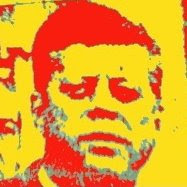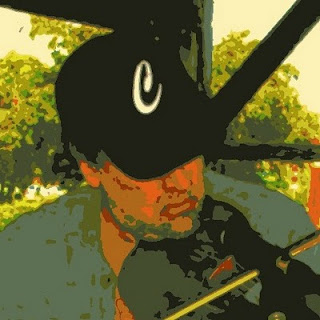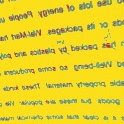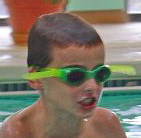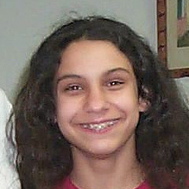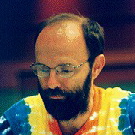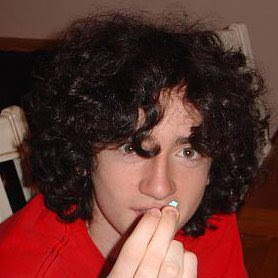welcome to 083!
A new term, new writing class, new developments:
static web- I've been cleaning it out. It's a mess. Over 300 pages, old projects, old archives, etc., and all my responsibility though in its present condition I'm a little embarrassed. Look for: new and usable student page; better index; more pop art throughout; old penny postcards from
US GenWeb Archive; better
bibs for teachers; fewer dead links.
Topic weblogs that collect student writing by topic, so that, for example, you can scroll down a
food weblog and read about food. For all, visit
eap2.
Chat survey systematically asking people if they recognize & understand chat symbols (:-)), some of which have begun to appear in essays.
Other things I'd
like to have time for:
chat research- on the skills involved in chat;
research on machine translators and their effects on students' understanding;
sociology research on Cooley & the dead white men, continuation of
language inquiry in general;
tryout of text-to-speech software;
voice comments on blogs;
more pop art from the magic computer camera;
getting more linguistics from the archives out in the open air where all can read it;
rebuilding this blog so that, for example, you can click on topics;
gaelic language revivial;
going to cesl social events;
Labels: cesl, chat, internet, jpcl, personal, weblogs
go hawks!
I went to the University of Iowa twice, once in the middle of my undergraduate years and once for my master's which they eventually gave me. I consider myself a loyal Hawkeye fan, though I was never much of a football fan, and come the NCAA Tournament (basketball), my allegiances are always clear, though divided these days with SIUC and Kansas.
But while I was in Iowa, their football program hired Hayden Fry, a successful and controversial football coach, to pull their team from the doldrums; he did that, successfully. Whether successful coaches do this by getting alumni to give players cars secretly, I have no idea, but about that time, traffic in Iowa City started chicagoizing, much to the locals' chagrin. However, that's not my point. What I am writing about is his marketing program. He got Iowa to hire some marketers, and together they instituted the notorious
Tiger Hawk logo (which I will not reprint here), which some people have since pointed out bears faint resemblance to the f-r-y of his name. And even that's not so bad, although I always thought it was hideously ugly. What irritated me most was that he
also made all other Iowa Hawkeye logos illegal.
Now, in terms of marketing, maybe this is established practice; I'm sure the marketing company told him to do it. He just figured that a brand new start was necessary in every way, mentally perhaps more than anything else, and that was part of the program. This was a tangential result, a small part, of a global marketing blitz: As part of this blitz, he even had the opposing locker room painted pink. Supposedly it would rattle the opponents. Did it? I have no idea, but it made the headlines; I didn't mind that part. It was the talk of the town for a while.
Far more insidious, to me, was the banning of all charging hawks, furry cartoon eagle-ish characters who graced sweaters that young boys like myself, with sets of grandparents from the state, would wear constantly (Iowa State had a similar one, which was, in fact, the one I wore)... these, I have a fond memory of, but can't find them, because I don't live in the state. I may try e-Bay, though, and see what I can find.
My point is, why the
ban? Did it help anything? Was he unable to really start over without it?
I'm a proud Hawkeye, but on this particular issue, I'm wearing pink, in protest.

Labels: personal
articles from around and about
Blogs
Rose, A. (2008, Feb. 1).
Decision: Blogs vs. New York Times The Long Now Foundation. http://blog.longnow.org/2008/02/01/decision-blogs-vs-new-york-times/. Accessed 5-08.
Wikipedia
Hesse, M. (2008, April 27).
Truth- Can you handle it?.
Washington Post. http://www.washingtonpost.com/wp-dyn/content/article/2008/04/25/AR2008042500922.html. Accessed 5-08.
Literacy/Reading/Education
Golan, A. (2007, Dec. 5).
The hand that moves the mouse.
Haaretz, http://www.haaretz.com/hasen/spages/930806.html. Accessed 5-08.
Shapiro, S. (2008).
It's time for a progressive vision of education.
Tikkun. http://www.tikkun.org/magazine/tik0801/frontpage/education. Accessed 5-08.
Open Access
Waldrop, M. M. (2008, April 21).
Is Open Access Science the Future? Scientific American Magazine, http://www.sciam.com/article.cfm?id=science-2-point-0&print=true. Accessed 5-08.
Second Life
Lakshmi, S. (2008, May 13).
Second lease of Life.
Business Standard, Markets & Investing. http://www.business-standard.com/common/news_article.php?autono=322703&subLeft=0&chkFlg=Strategy. Accessed 5-08.
Bhaskaran, P. (2008, Mar. 29).
Going gets real in virtual world. Gulf News. http://www.gulfnews.com/world/India/10201339.html. Accessed 5-08.
New World
Eisenberg, M. (2008, May 1).
The parallel information universe. Library Journal. http://www.libraryjournal.com/article/CA6551184.html. Accessed 5-08.
Feran, T. (2008, Apr. 12).
Case Western Reserve expands Cleveland Plus virtual experiment.
Plain Dealer, Cleveland. http://www.cleveland.com/living/plaindealer/index.ssf?/base/living-0/120798921322270.xml&coll=2. Accessed 5-08.
Labels: bib, internet, second life, wikipedia
Linguistics at SIUC retrospective II: Luncheons
In front of me now, thanks to Diane Korando, is an admittedly incomplete list of Linguistics Luncheon posters, going back from about 2005 to 1996; there may have been Luncheons before that, and may have been a few since, but this is what I have. The department here was in the habit of finding good linguists to bring to SIUC, and have them give informal talks, often in Faner Hall, or the Illinois Room, the Thebes Room, or the Corinth Room of the Student Center. I list a few that speak to me:
Professor Ken-Ichi, Associate Professor of Linguistics, Ryukou Univ., Kyoto, Japan- Sept. 7, 2005, Faner 1005
"A Historical Review of the Ancient Japanese Vowel System"
Dr. Stuart Davis, Dept. of Linguistics, Indiana Univ.- Oct. 22, 2004, Faner 1326
"The Controversy over the Origins of African American Vernacular English: An Untapped 19th Century Source in the Academic Writings of Francis Lieber"
Matthew J. Gordon, Assistant Professor, Univ. of Missouri-Columbia- March 19, 2004, Thebes Room
"Current Speech Patterns in Missouri with Some Glimpses into Illinois"
Klaus-Uwe Panther and Linda L. Thornburg, Hamburg University, Sept. 12, 2003
"Translating French Stative Verbs in the
passe simple: What's Metonymy Got To Do With It?"
Yoichi Miyamoto, Osaka Univ., Japan and Massachusetts Institute of Technology, April 23, 2001, Thebes Room
"Specificity Effects in Japanese"
Melinda Reichelt, Univ. of Toledo- April 6, 2001, Thebes Room
"FL Writing in the US: What the Research Tells Us"
Geoffrey Nathan, SIUC- November 3, 2000, Thebes Room
"Why are Vowel Systems Triangular and what's that got to do with Elevators?" (draws on work of Rudi Keller)
Prof. Yu-Ling (Amanda) You, Applied Foreign Lang.'s Dep't, National Yunlin Univ. of Science & Tech., Taiwan- July 21 (2000?)m Faner 3512
"Defining Topic Continuity in Chinese Written Discourse"
Joel Hardman, SIU-Edwardsville, February 25, 2000, Thebes Room
"Language Teacher Belief Systems: Origins and Adaptations"
Abdesalam Soudi, Mohammed V University, Rabat, Morocco, October 18, 1999, Illinois Room
"Transitional Agraphia in Arabic: A case study of a patient with postgraphemic deficit disorder"
Suchada Rattanwanitpun, Dep't. of Curriculum & Inst., SIUC, & Burapha Univ., Thailand- Sept. 10, 1999
"The Effects of Prior Content Knowledge on Second Language REading Comprehension Evaluation"
Aisha Blackshire-Belay, Professor and Chair, Dept. of Africana Studies, Indiana State Univ., April 6 (year?), Faner 1326
"Gastarbeiterdeutsch: Cultural and Linguistic Diversity in Society"
Lise Winer, Linguistics Dept., SIUC, April 19, 1996, Corinth Room
"Creole Texts versus English Readers"
Some of the best were our own faculty, here in Linguistics or in Foreign Languages or other departments, but in this listing I included mostly people who came from abroad. Many were in this country already at the time they spoke; I remember the department drawing upon its own collective knowledge of linguists in the area to come up with a good schedule each year. A good semester would have many Luncheons; all that I remember were well-attended. I remember also two, the posters of which were not in this list. One was Walt Wolfram, famous dialectologist from North Carolina, who spoke quite recently; another was by a famous linguist from Hawaii, whose name escapes me at the moment, but who gave a very memorable talk. I would go to these if I could, but we CESL teachers were often busy, teaching at both 11 and 1; gulping down lunch as we prepared or graded our last stack. Those were the days!
Labels: linguistics, siuc
linguistics at SIUC: retrospective
When I'm on break, as I am now, I sometimes go to an underground place that I know and love, but feel like very few others know about. It's the web archive records of the old Journal of Pidgin and Creole Linguistics - which, fortunately, saved, at least for the time being, a very interesting slice of the history of linguistics at SIUC.
The Journal, brought to SIUC by Dr. Glenn Gilbert, had at that time a webmaster, Caro Jacques I believe (though these pages list the author as Jeffery Parsell), who patiently put much of what it was doing on the web. Though one now has to know how to find it, as it is gone from all but the archives, short articles from old JPCL's can be found there; longer, more substantial ones also; longer pieces on Creole language in general; obituaries; a glossary of pidgin and creole terms; an index of old JPCL articles; in short, all kinds of stuff. I bring you a couple of examples, both called "Short Notes".
http://web.archive.org/web/20011202084455/www.siu.edu/cwis/departments/cola/ling/online/snotes/sn17.htmSanson Pirog, by Derek Bickerton and Marcel Rosalie (Issue 5.1, 1990)
a "Short Note" about fishing-boat songs in the Seychelles Islands in the Indian Ocean.
and
http://web.archive.org/web/20011218045527/www.siu.edu/cwis/departments/cola/ling/online/snotes/sn54.htmON THE (SENSATIONAL) SURVIVAL OF KIKONGO
IN 20TH-CENTURY CUBA by Armin Schwegler
Issue 15.1, April 2000
There are many reasons to be interested in these documents, besides the fact that they are exactly the kinds of things I like to read. In the second article, there is clearly an academic argument about the survival of Kikongo, an African language, in Cuba and other places in the Americas, as opposed to a better-established theory that what survived was a combination of languages (it's clearly possible that both were right). Not that I know anything, really, about this particular dispute. It's more that I feel that putting it in public was itself an important act- on the cutting edge, one could say, of a general trend of making academic journals public, a trend that is continuing today and that in general is good, I feel, for such conversations. For one thing, people like me can participate, from home, late at night, whereas otherwise I might not have used my precious daytime working hours to go find the place in the library where I could have dug this up. Now if it were on a blog, I could also comment, if I wanted to, but that's another story.
My second point, and this really speaks to the first example, is that the web makes it far more likely that people, some people, any people, linguist people, will actually
find anything like this that is quite hard to find- this is what Google is good for. And I happen to know that such songs as these, and accounts such as Bickerton & Rosalie's, are quite valuable in their own way.
And this brings me to the rest of the story. The JPCL was moved to Ohio State soon after these were put on the web; SIUC inadvertantly deleted the file as "inactive" with our permission, as we believed that Ohio State now owned it, and would put it directly on their web (perhaps they did; I'm not sure, but it's not there now); the JPCL, meanwhile, has returned to being an offline, academic journal, available only in libraries and by subscription; but worse, linguistics at SIUC has suffered a decline, and who would even know - besides me, that is - that such cool stuff could be found so deep in the web- with SIUC's name still on it? That's why I'm on this earth, I guess. For that reason, and to ponder the following questions: could more of this be salvaged, and brought to the web where we all could read it? Will SIUC get back into the groove, and realize again what it means to have active, productive Linguistics publications? Will the field of linguistics come to enjoy the explosion of possibilities brought by the connection of world peoples through the new media?
I don't know the answers, sorry for teasing you. Enjoy these, such as they are; thanks again, Caro (or Jeff?), and thanks again to the
Web Archive for being there for us when we need it...
PS - though it has taken me a while to get the above links to work (let alone to
wrap, I have not made it easy for anyone else to actually do what I do, and go trolling through the caves of the archives. To do that, put the old JPCL address (www.siu.edu/departments/cola/ling) into the archive; December of 2001 works well; see what you can find!
Labels: endangered languages, internet, jpcl, linguistics, siuc
i've got a few i could lend you...
Two new things I've written, both unpublished, which I'd like to comment on.
Leverett, T. (2008, Apr.).
Tale of two hypotheses. Unpublished manuscript. http://www.siu.edu/~cesl/teachers/pd/k2me3.html.
Leverett, T. (2008, May).
Principle wanted. Unpublished
manuscript. http://www.siu.edu/~cesl/z/sos/pw.html.
First, it may be brazen of me, or rather naive, to just put this stuff on the CESL server, but CESL and SIUC in general seem to be stable in terms of what sits in their space; it at least stays there, though it may be ignored or unceremoniously dumped occasionally. I say brazen, because if it is really traitorous to the field, some probably wouldn't want it there; I say naive, because if it is of any value, I might want to keep it for myself. But, since a roof accident of Dec. 2007, I've become more urgently transparent, knowing that I could be gone at any moment, and thus so would all this hard work and deep thinking about the nature of language. I come up with this stuff, by the way, as I'm absently watching boys tumble around a front yard, climbing trees, landing on each other, etc.
The first I put with my work on Krashen (Krashen-2-me.html) because I've always thought Krashen had important stuff to say about language learning, and I agree with most of it. But I don't agree with these two, at least not completely. I wrote this literally on my way out the door to TESOL, in early April.
But as I stewed on it a little, it occurred to me that, rather than attack poor Krashen, who I actually admire, it would be more to the point to explain what principles
are involved in language learning, rather than continuously harping on what these guys had wrong. After all, collectively, the field has been full of very interesting and insightful people. Somehow it seems that collectively the entire group of us could pull something together that would be useful to the world.
The second is more related to language and language change itself, and thus I put it on the "sos" files- the language as a self-organizing system pages. This is closer to what I'm really getting at- that we can explain language behavior in terms of natural human processes that govern other human behaviors also. To this end I've begun to study
Cooley and the looking glass self. The title, by the way, comes from a "Help wanted" ad back in my job-hunting days- it was a school district in Minnesota, I believe...at the time, I thought, I've got a few I could lend you.
To recap, briefly:
There is no "Language acquisition device" or special mechanism that allows humans and only humans to do the complex decoding necessary for language understanding. There are no natural restrictions that govern all languages; humans are free to do as they wish in creating and changing language. And in fact, they do a wide variety of things- restricted only by the shape of the mouth, the ability to hear certain sounds, and the intrinsic nature of words referring to either things or actions.
Language behavior is best analogized by looking at human behavior in, for example, walking across a campus, or driving across town: One starts by doing as one has observed others doing; One's behavior is governed, somewhat, by perceptions and actions of others; One carefully measures the price vs. benefit of trying new actions, and acts accordingly; The brain, in its ruthless efficiency, is always open to options of reorganization, but is innately cautious because of the high price of failure; in addition, people have different values with respect to this fear of failure, and thus develop a more or less cautious approach to their production.
This only begins to sum up what I've been thinking about- but, if interested, jump in. I welcome comments.
Labels: bib, chomsky, krashen, language, learning theory, siuc, sla




























